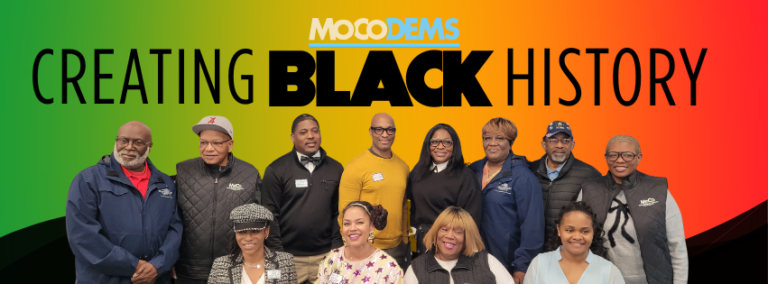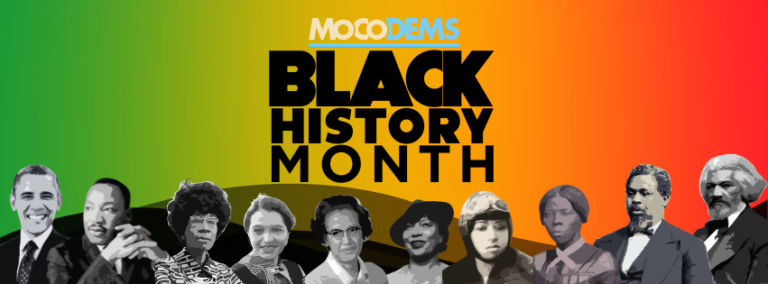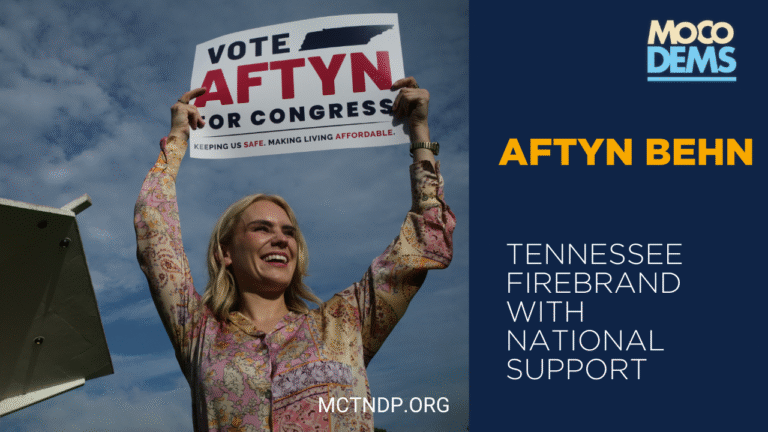By Jessica Johnston
People align with political parties for various reasons when they vote. Voting “down ballot” for Republican or Democrat candidates serves as a shorthand for choosing individuals who represent the values and policies they prioritize. Some people consistently support a single party because their family and loved ones do, following suit out of tradition or shared beliefs. But what happens when someone decides to change course, switch parties, and rethink how they select candidates?
In the past decade, the Republican Party has undergone a significant shift with the rise of Donald Trump and far-right politics, prompting many to reassess what it means to be a Republican today. For some, this shift has led them to leave the party and take a closer look at the candidates they support.
I spoke with two members of the Montgomery County Democratic Party who voted Republican in the past before they eventually changed their approach. Here are their stories about why they made the switch and their advice for others considering a similar change for this year’s election cycle.
What specific issues or policies led you to shift from voting Republican to voting Democrat? Was there a particular moment, event, or candidate that changed your perspective on political parties?
Beth Tallent: Unfortunately, I based my political ideology on beliefs without doing much research. I tried to vote in as many elections as I could, but I wasn’t one to follow political news closely. I allowed others to influence me, and against my better judgment, I voted for Donald Trump, swayed by talk about Hillary’s emails and accusations of her being a traitor to our country. Looking back, I find it a bit laughable how easily I was persuaded by such nonsense. Almost immediately after voting for him, I felt a wave of sickness and thought, “What the hell did I just do?” I stood in front of that voting booth screen for about ten minutes, struggling to decide, and I should have listened to my gut.
[Trump’s] hateful rhetoric encouraged me to reflect on my beliefs and understand how my vote was going against my own interests. I began to see how his divisive language and policies didn’t align with the values I stand for, such as freedom for people to be themselves and the belief that our laws should not be based on anyone’s ideology.
Having daughters has also played a significant role in shifting my perspective on certain issues. Listening to their views and opinions opened my eyes to different perspectives and helped me reconsider my own beliefs. Their insights about social justice, equality, and personal freedoms encouraged me to reflect on the kind of world I want them to grow up in. I realized I was voting against my own values and interests, and this realization has pushed me to educate myself more deeply on political issues and align my beliefs with a party that reflects those values.
Raymond Deeren: The Republican Party at the turn of the 21st century did a good job of selling itself with its rhetoric. Who doesn’t want a balanced budget, peace, common sense, etc? That sounds good to an 18- or 22-year-old voter. Or even an older first-time voter. That was me in the 2008 and 2012 election cycle.
The GOP banks on people not looking past the rhetoric, though. Looking back, the potential administrations of McCain and Romney would have “balanced the budget” just like any Reagan Republican before them: by cutting social safety nets and privatizing social services. They would have created “peace” by funneling public dollars to the military industrial complex and away from education, social security, domestic infrastructure, and climate action. Their “common sense” would have only appealed to those who believe they will never need what everyone in a community-minded society needs: equitable access to education, food, social services, safe infrastructure, clean air.
In short, the Republican Party appeals to people who believe in providing only for themselves and their immediate family. Doesn’t sound like the worst thing, right? Well, what about the community you want to live in, that you want to raise your family in? Shouldn’t every individual, every family be your concern? It’s not like Republicans live in a vacuum. Like Wes Golden [Mayor of Montgomery County] said, Democrats (and Independents, leftists, even apolitical people) “have infiltrated” all aspects of life. What’s so bad about caring about everyone, even strangers?
Even shorter: The Republican Party takes money away from the hardest working people in our country and expects them to just deal with it.
How do you feel about the direction the Republican Party has taken in recent years?
Beth Tallent: The Republican Party has shifted in a way that I simply can’t align with anymore. It has become a party driven by fear-mongering and hate, constantly stirring up division and distrust. Trump’s hateful rhetoric has made it painfully clear to me that I was voting against my own interests and that I don’t align with the party’s values anymore. The direction they’re heading in feels like a threat to democracy itself. They have embraced authoritarian tendencies, actively undermining our democratic processes, as seen with the widespread denial of election results and the attempt to overturn a peaceful transfer of power.
I’ve also watched as they’ve stacked the courts with conservative judges, pushing decisions that are out of line with the majority of the country’s beliefs, like overturning Roe v. Wade. Their focus on culture wars—attacking things like Critical Race Theory, LGBTQ+ rights, and climate change science—has created even more division, and it’s not something I can stand behind. Their constant push to inject religious ideology into politics is something I strongly disagree with. I believe in freedom of religion, but I also believe in freedom from religion when it comes to our Laws.
Although I still believe in the strength and integrity of our government processes, the Republican Party’s embrace of Trump and his malignant narcissism has deeply affected my trust in their leadership. Their refusal to hold him accountable for his corrupt behavior has shown me that they are no longer the party I can stand behind. It’s the party’s shift towards authoritarianism, along with their divisive rhetoric, that has led me to no longer align with them.
Raymond Deeren: I thought the Tea Party was going to be the thing that tore the GOP in half. I was not prepared for the sudden crash into out-loud bigotry that came leading up to and after the 2016 election cycle. Even if I was still aligned with how Republicans spend taxpayer dollars, their devotion to turn people’s fears and anger into hatred is unacceptable. There is no mental gymnastics one can do that justify this new GOP voting base. If a Republican is reading this and feels a certain way about it, well, a hit dog hollers.
How has your view on key topics like the economy, healthcare, or social justice
evolved over time?
Beth Tallent: Over time, I’ve come to understand how my vote can significantly impact key issues like the economy, healthcare, and social justice—not just for myself, but for others as well. For instance, I’ve realized that decisions made in Congress can directly affect things like the cost of prescription drugs, making healthcare more accessible for families in need. I’ve also seen how legislation can determine whether children have access to nutritious meals, which is essential for their well-being and development.
In the past, I may not have fully grasped the importance of these connections, and I often found myself influenced by fear-mongering and misinformation. Recognizing this has motivated me to educate myself and seek out reliable sources to better understand the implications of policies and legislation. It’s crucial to look at the broader picture and consider how political decisions affect people’s everyday lives, especially those who are most vulnerable.
Additionally, I believe it’s essential to rely on scientific data and expert opinions when crafting political policies and legislation. This is particularly important when addressing issues like climate change, as informed decisions can benefit not only our communities but also our planet. By prioritizing evidence-based approaches, we can create sustainable solutions that address the pressing challenges we face today.
Raymond Deeren: I am a white guy from the middle of the woods. I grew up hunting, logging, mudding, and keeping to myself. I didn’t see any need for Obama’s “Change,” and I voted accordingly. Money was tight, but I didn’t need much. Then I left the woods of Michigan and lived in Chicago, Milwaukee, Oregon, and now here in Clarksville. I still get out to the woods as much as possible, but now that I’ve lived across the country and lived with, worked with, and loved so many people that are unlike me, when I return to the woods, I’m different than who I was when I left them.
What advice would you give someone who has historically voted Republican but is
considering voting Democrat in the 2024 election cycle?
Beth Tallent: I would suggest looking at reliable data from past presidents—Republican and Democrat—to compare their impacts on things like the economy, job creation, and crime rates. Pay attention to the policies of each party and see which have truly benefited corporations versus those that have benefited the people.
It’s also crucial to focus on your local political landscape because that’s where you’ll see the most direct impact on your day-to-day life. Local leaders make decisions that affect your community’s schools, healthcare, infrastructure, and public safety. By understanding what’s happening at the local level, you can vote for the candidates and policies that align with your values and create positive change where you live. Your local government has a real, tangible effect on how you live, and staying informed and active in those elections is essential.
Additionally, it’s a great idea to get involved in your local politics through volunteering. Volunteering can give you a clearer picture of the issues affecting your community and allow you to contribute to meaningful change. Whether it’s canvassing, attending town hall meetings, or supporting a candidate who shares your values, being engaged locally strengthens democracy and helps ensure that your community’s needs are heard and addressed.
And most importantly, look into Project 2025. This isn’t just Trump’s plan—it’s the Republican plan for an authoritarian style of governing that could end our democratic Republic. This isn’t something to take lightly, as it could fundamentally change our system of government. And your voice thinking choice can be taken away.
Raymond Deeren: Your vote is not just for you. Your vote is not just for your family. We are all connected and we all need each other. The unhoused on the corner of Peachers Mill and Providence deserve access to the same level of safety, dignity, and infrastructure, like basic sidewalks and public transportation, as those who own a home in Sango. Women, no matter their circumstances, deserve as many rights to their bodies as men. Our queer friends, family, and neighbors deserve a sunny walk on the Greenway without fear of hate or violence. Our educators, laborers, soldiers, and even our under/unemployed deserve access to healthcare that we, as a community, pool. Our Black/Brown and other Clarksvillians of Color deserve to have representation that doesn’t fear, tokenize, or villainize them.
The Republican party wants you to see life as zero sum. They want you to believe that what I said here is only possible if we take from each other. Really, what they’re saying is that they themselves don’t want to be the ones to give up something: their control. The first time I voted against the GOP, I felt fear. I was afraid that I was turning my back on something. What I was really doing was opening myself up to a life where I wasn’t the center of attention. I live a fuller life because of it. You can, too.



